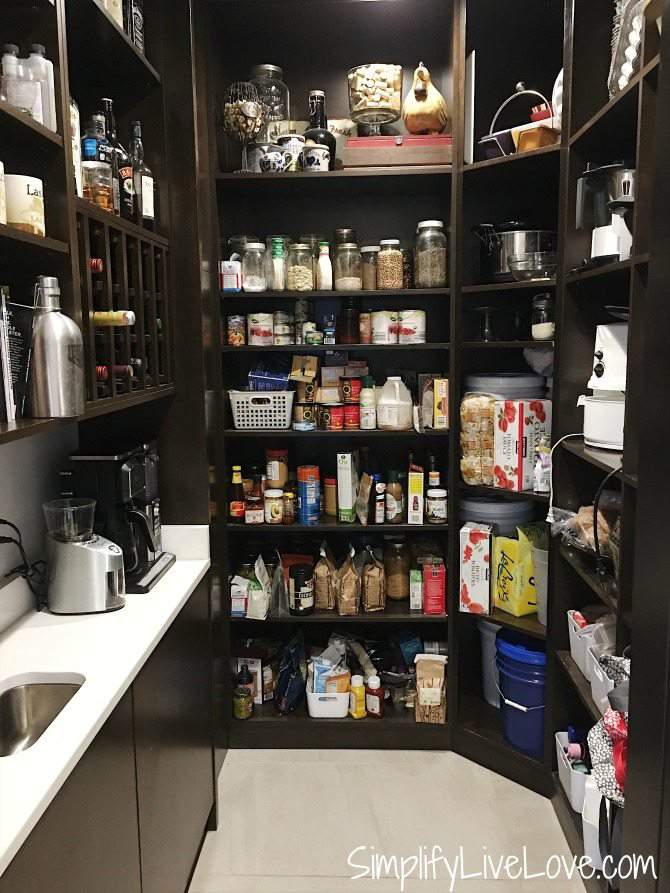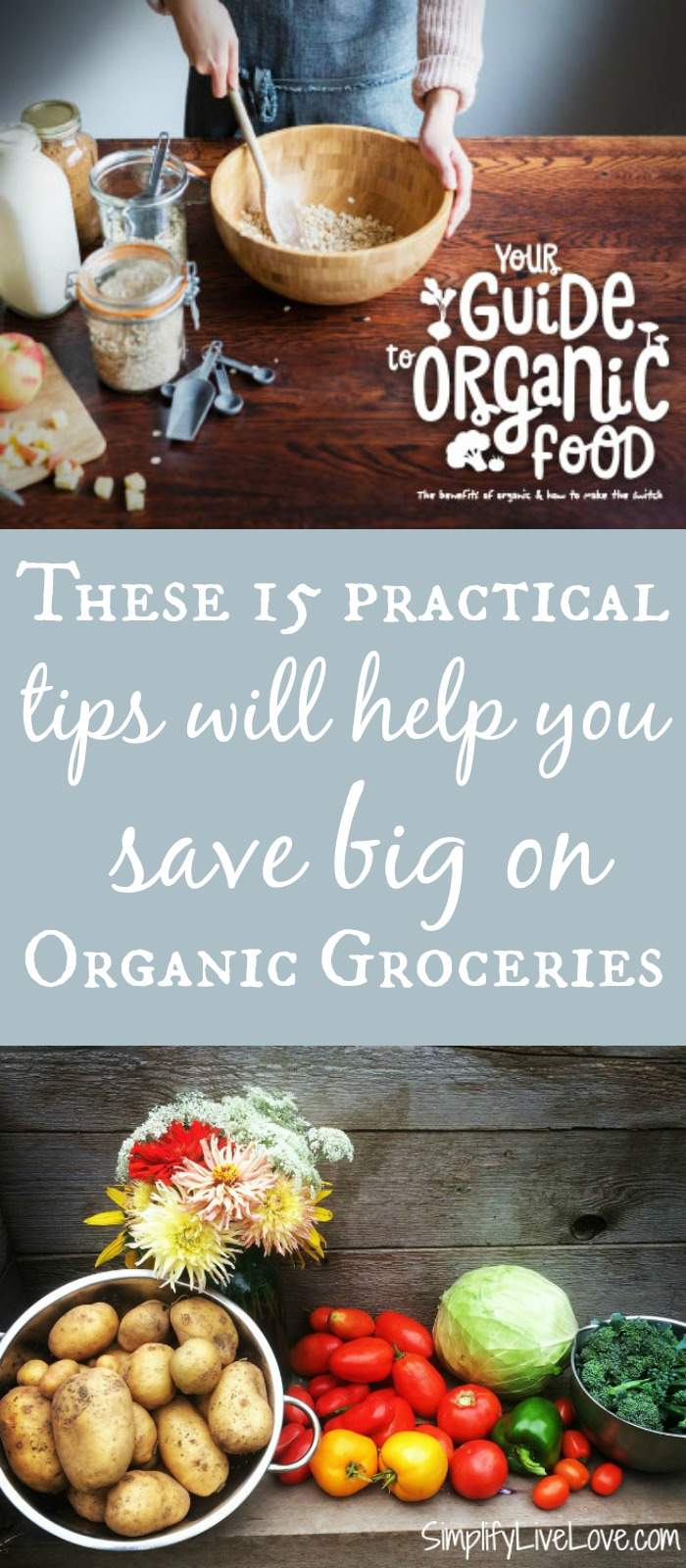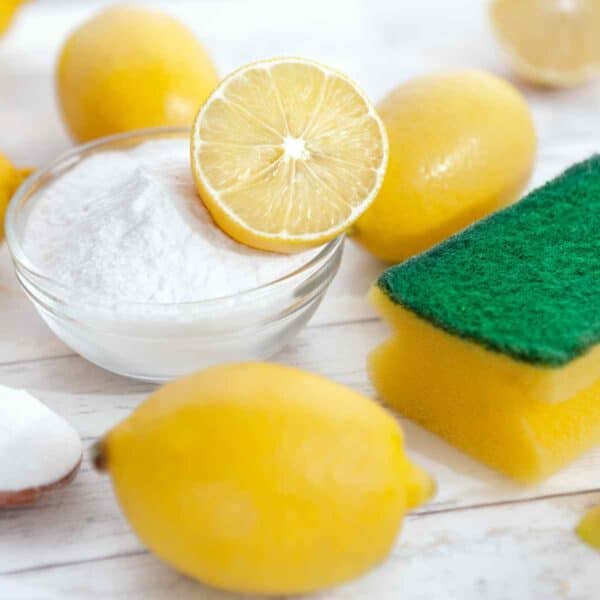15 Things You Must Know to Save Money on Organic Food
on Jan 25, 2017, Updated Jul 18, 2020
This post may contain affiliate links. Please read our disclosure policy.
This practical list of tips will help you save money on organic food to reduce your exposure to pesticides, protect pollinators, and avoid GMOs. Switching to organic food doesn’t have to break your bank, if you follow these simple tips.

*Many thanks to Nature’s Path for sponsoring this post. All opinions are mine. #AlwaysOrganic.*
15 Things you Must Know to Save Money on Organic Food
Despite what the naysayers say about certified organic food being being an unnecessary rip-off, there are many valid reasons to switch to organic food. If you’d like to lessen your impact on the earth, reduce dependence on fossil fuels, ingest fewer toxic chemicals and more nutrient-rich foods, and help save the bees, the monarch butterflies, and other pollinators, you might consider switching to organic foods.
You might think going organic is too expensive and not practical for you, yet there are many things you can do to help keep the cost of organic food down. Today I’m sharing 15 cost saving tips with you to help you add more organic foods to your diet.
Know Where to Buy Organic Food
The first thing to do if you want to keep the cost of organic food as low as possible, is know where to shop. More and more stores are selling organic foods these days – did you know even ALDI has an organic line? It’s true. I buy a lot of organics at ALDI and I’m very happy with them. See if your favorite store carries an organic line and compare costs – sometimes organics cost about the same as their conventionally grown counterparts.
Buy in bulk
There are two ways to buy in bulk and both ways can add up to significant savings on organic food. The first way is to shop for beans, spices, nuts, and flour from bulk bins in many grocery stores. You’ve seen the bulk bins right? They often offer significant savings over smaller packages (and produce less waste too). The second way to buy in bulk is to buy in large quantities. I buy lots of dried good like wheat berries, rice, dried beans in large quantities (25-50 lb bags) for a reduction in price.
Buy online
Don’t forget that you can buy on line! Amazon, Thrive Market, direct from companies, and organic coops like Azure Standard are great places to find organic foods for less money. Shop around, make a price-point list, and order organic food from the comfort of your own home. Having it show up directly to your door is a pretty amazing way to grocery shop too.
Buy directly from the farmer or from CSAs
Another way to save money on organic food is to buy it directly from farmers or from a CSA. I’ve never participated in a CSA myself, but I buy a lot of organic items directly from farmers in my area. It’s a great way to support your local economy, reduce fossil fuel use (less transportation), and really get to know what you’re buying and feeding your family.

Proper Storage Techniques for Organic Food
Minimize produce food waste
Learn proper storage techniques to keep your produce fresh longer. Do you know which fresh food should be stored in the fridge and which should be stored on the counter? My partner for this post, Nature’s Path, recently published a free ebook called Your Guide to Organic Food. This beautiful ebook has lots of practical tips for switching to organic food, making produce last, and yummy recipes too! It’s also free so go here to grab Your Guide to Organic Food and check out their helpful tips for properly storing produce.
Minimize food waste for shelf-stable foods
Just like there are tips for making produce last longer, there are also tips for making shelf-stable food last longer too. For instance, store your spices away from the heat of your stove. Make sure your dried goods are in air-tight containers to prevent spoilage and bug infestation. And store oils in cool, dark areas away from heat and light.
Waste Not / Want Not
My dad’s mantra when I was growing up was Waste Not Want Not. To make your organic grocery dollars last longer, make sure you eat up those leftovers. I know a lot of people don’t like leftovers, but for the life of me, I can’t figure out why. Leftovers are amazing! As often as I can, I try to have leftovers to reduce the amount of time I have to spend in the kitchen. If you don’t like leftovers, maybe you can think of creative ways to turn them into a new meal. Whatever you do, don’t let those leftovers go to waste if you want to save money on organic food.
How to Prioritize your Organic Dollars
Buy in-season
Have you ever noticed that in-season produce is cheaper than out-of-season produce? Yesterday I was in the grocery store and a little old lady was griping about the strawberries. “They’re just so expensive,” she said. “And they look terrible.” She was really muttering to herself, but I couldn’t help myself and replied, “Yes, it’s just not quite strawberry season yet, is it?” There’s a reason in-season produce fruits and veg are cheaper – they are in big supply and don’t have to be trucked in from another hemisphere.
Eating organic strawberries is great in the spring and early summer, but in the winter, citrus is where it’s at. Oranges, grapefruit, tangerines. These are the organic fruits we should be buying right now to maximize our organic spending dollars.
Freeze & Can
Another way to stretch your organic dollars is to freeze and/or can organic produce when it is in season. Buy in bulk and then add to your freezer! I love having frozen blueberries in my freezer in the winter. I’ve also frozen pomegranate seeds and smashed avocado in the winter when these produce items are in season and cheap. Then I can pull out the frozen foods and enjoy them even when the price and quality at the grocery store is outrageous.
Dirty 12 / Clean 15
As much as I would like to buy everything I can organic, the cost is sometimes prohibitive. That’s when I turn to the Dirty 12 / Clean 15 list. There are certain produce items I always buy organic: apples, grapes, and berries, because they have the highest levels of pesticides and are very high on the Dirty 12 list. But avocados, pineapples, and kiwi are on the Clean 15 list and have a lower level of pesticides, so I don’t feel as bad if I have to buy conventional versions of fruits and produce on the Clean 15.
Use Coupons
I love the memes I see that claim you can’t use coupons if you eat real food, because it’s just not true. I’ve found coupons on lots of organic food that I’m happy to use. Every dollar saved is a huge win in my book! Nature’s Path even has a coupon code to use in their Guide to Organic Food book! Hint hint. 🙂

Get Organized to Save Money on Organic Food
Make a Price-Point list
A great way to save money on organic food is to make a price-point list. Prices fluctuate a lot at the grocery store so if you keep track of what you pay, it’s easy to stock up on essentials you know you will eat when they cost their lowest.
Make a weekly menu plan
It’s true that having a menu plan is a great way to keep you on track. Knowing what you’re going to eat makes sure that you actually eat the food you buy and helps you stay out of unhealthy restaurants. I’ve tried many types of menu planning from weekly, to bi-weekly, to a monthly plan to find what works best for me. It’s simple to write down meals you’d like to serve in your planner or on your calendar and is very helpful. If you don’t currently menu plan, give it a try!
Keep a stocked pantry
A stocked pantry is such a huge help when you’re trying to save money on groceries, especially if you keep track of prices and stock up when your favorite organic goodies are on sale. Always having a few items on hand for easy organic meals when you don’t feel like cooking or simply don’t have the ingredients for a more elaborate meal is a great way to stay out of stores and restaurants.

Grow Your Own Organic Food
Grow your own garden
Growing your own garden is such a great idea because it can save you money on groceries and it’s a great way to connect with the earth too. I have a big garden very year and love eating the produce I grow in it. I also involve my kids and think it helps them to love fresh fruits and veggies too. If you don’t have a spot for a garden, maybe you have room for a couple containers. It’s not hard to grow tomatoes on your porch or balcony! You might be surprised what all you can grow in a container garden.
Grow your own kitchen herbs
If you enjoy cooking with fresh herbs, a great way to save money is to grow them yourself. A basil plant costs as much as the cut basil my grocery store sells. A nice kitchen window is a great place to keep a few herb plants and looks as pretty as it is functional.
These tips help me feed my family of six an organic menu for less. We don’t eat 100% organic, but knowing how to prioritize my organic dollars and make the organics I do buy last as long as possible is very important to me. I hope you found something useful in this list too.
Many thanks to Nature’s Path for sponsoring this post. If you’d like to check out their amazing {and free} ebook, Your Guide to Organic Food, head over and grabt! It really is a beautiful book with yummy recipes and more tips. Do you have another tip that I didn’t mention?














These are great tips. I am so going to Aldi this week. I used to shop there when I lived in Germany, but haven’t shopped there since we moved back to the States. I’m a big belierver in menu planning, to save time, money and prevent waste.
This is a great resource for anyone wanting more information about eating organic. I love CSAs and buying/preserving in bulk. Thanks for the tips!
Wonderful tips. We do our best to buy organic when we can. We belong to two CSA’s – on in the summer and another in the Fall. I hate going to the grocery store to purchase fruit and vegetables that are not fresh from the garden. We can and freeze a lot too.
Great tips. Our freezer quit last week and I hated seeing the pumpkin and stewed apples having to meet the compost bin. Once we get a new one sorted out, I’ll again concentrate on stocking up on items when they’re in-season as it helps so much.
Making a weekly menu plan has really helped us and our budget. These are all really good tips. Your pantry looks amazing!
We try and eat organic where we can, but you are right, it is expensive. Thanks for the tips!
This has been incredibly useful, thank you so much for the tips. I honestly thought I knew a lot about saving costs on organic food and was surprised when you came up with tips I never even thought of. Thank you
You’re welcome, Stephi. Glad it was helpful. 🙂